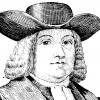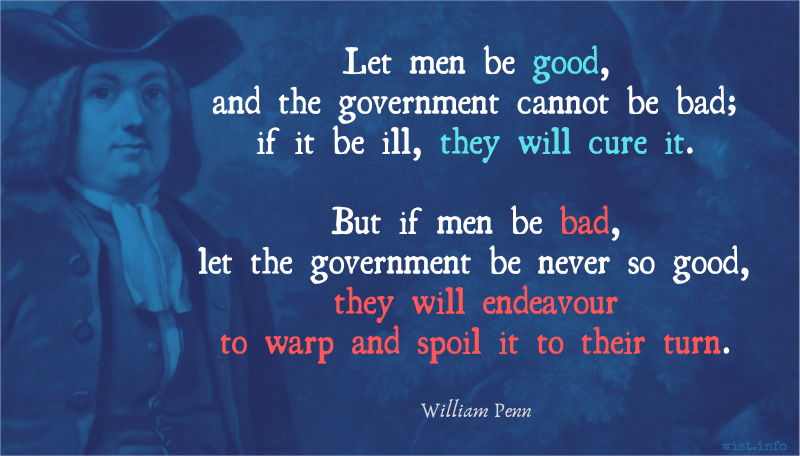No pain, no palm;
No thorns, no throne;
No gall, no glory;
No cross, no crown.William Penn (1644-1718) English writer, philosopher, politician, statesman
“No Cross, No Crown” (1682)
Originally written while a prisoner in the Tower of London (1668-69). See Quarles (1821).
Quotations by:
Penn, William
Governments, like clocks, go from the motion men give them, and as governments are made and moved by men, so by them they are ruined too. Wherefore governments rather depend upon men, than men upon governments. Let men be good, and the government cannot be bad; if it be ill, they will cure it. But if men be bad, let the government be never so good, they will endeavour to warp and spoil it to their turn.
William Penn (1644-1718) English writer, philosopher, politician, statesman
First Frame of Government for Pennsylvania, Preface (1682)
(Source)
A good End cannot sanctifie evil Means; nor must we ever do Evil, that Good may come of it. Some Folks think they may Scold, Rail, Hate, Rob and Kill too; so it be but for God’s sake. But nothing in us unlike him, can please him.
William Penn (1644-1718) English writer, philosopher, politician, statesman
Fruits of Solitude, #537-539 (1682)
(Source)
Truth often suffers more by the heat of its defenders, than from the arguments of its opposers.
William Penn (1644-1718) English writer, philosopher, politician, statesman
Fruits of Solitude #142 (1682)
Source text
Neither urge another to that thou wouldst be unwilling to do thyself, nor do thyself what looks to thee unseemly and intemperate in another.
William Penn (1644-1718) English writer, philosopher, politician, statesman
Some Fruits of Solitude, # 71 (1693)
See also Matthew 7:12.
‘Tis no Sin to be tempted, but to be overcome.
William Penn (1644-1718) English writer, philosopher, politician, statesman
Some Fruits of Solitude, #450 (1693)
(Source)
See Shakespeare.
Speak properly, and in as few words as you can, but always plainly; for the End of Speech is not Ostentation, but to be understood.
William Penn (1644-1718) English writer, philosopher, politician, statesman
Some Fruits of Solitude, Part 2, “Of Conduct and Speech,” #122 (1682)
(Source)



